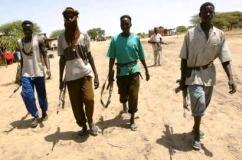Darfur peace talks hobble along amid bitter disputes over security
ABUJA, Oct 26 (AFP) — Delegates at peace talks to end a conflict in Sudan’s western Darfur region traded bitter accusations of ceasefire violations on Tuesday as African Union mediators battled to keep the conference on track.

|
|
Members of Sudan Liberation Army walk with their rifles at Ashma village 30 km (19 miles) from Nyala, south Darfur, October 6, 2004. |
The conference’s first full session of political dialogue broke up after less than an hour in the morning when rebel envoys asked for more time to prepare, while parallel talks on the security situation in Darfur remained deadlocked.
“The road to peace is very rough,” admitted Mahgoub Hussain, spokesman for the rebel Sudan Liberation Movement (SLM), which came to the Nigerian capital hoping to win greater autonomy and government funding for Darfur.
“How can we be happy to be at the negotiating table here in Abuja while on a daily basis we receive reports of assault, killing, rape, looting and aerial bombardments against our people by government forces?” he demanded.
“This is not acceptable to us and that is why we insist on firm commitments on improvement in the humanitarian and security situation in Darfur before any meaningful progress can be made in the negotiations,” he declared.
Meanwhile, the Sudanese embassy in Abuja released a statement rehashing week-old allegations that rebel forces had attacked and robbed 123 Nigerian Muslim pilgrims passing through Darfur on their way overland to Mecca.
AU officials said that political talks would restart on Wednesday and that mediators would meet separately with rebel and government delegates to hear their views on security before attempting to draw up a draft agreement.
But there was still no sign of the two sides coming together, nor of them singing up to a draft humanitarian protocol which, if implemented, would have enhanced the protection of Darfur’s 1.5 million displaced people.
Tens of thousands of civilians have been killed by disease, hunger and militia violence since February last year when two rebel movements — the SLM and the Justice and Equality Movement (JEM) — rose against Khartoum.
The insurgents accuse the Arab-led central government of persecuting and discriminating against Darfur’s black African tribes, and have called for more freedom and a greater share of Sudan’s oil revenues.
The government’s response was to unleash the Janjaweed, an Arab mounted militia, which the United Nations and human rights monitors have since accused of atrocities against civilians. The United States has spoken of genocide.
The UN Security Council is due to meet next month on the issue and African leaders are keen to demonstrate that their continent can handle its own crises before western powers make good their threats to impose economic sanctions.
There are two main elements to the African Union plan: the Abuja peace talks — which are expected to last at least three more weeks — and the deployment over the same time period of a 3,250-strong African truce-monitoring force.
But on Tuesday, both projects were struggling to make progress.
In Abuja, rebel military leaders were refusing to sit face-to-face with their government counterparts to thrash out a security deal.
The insurgents are calling for the Janajaweed to be disarmed and for a no-fly zone to prevent government air strikes before they consider disarming. The government says both sides must lower their guns simultaneously.
And in Khartoum, Foreign Minister Mustafa Osman Ismail told reporters late Monday that his government was not yet ready to allow AU peacekeepers to be flown into Sudan on board US transport planes.
The truce monitors are to be almost entirely African, save for a handful of technical advisors, but the United States and the European Union have said they will provide logistical support for the mission. US planes are on standby.
A small vanguard force of around 400 Nigerians and Rwandans is already in Darfur, but more troops from these countries and from Gambia, South Africa, Egypt, Algeria and Tanzania had been expected to begin arriving next week.
